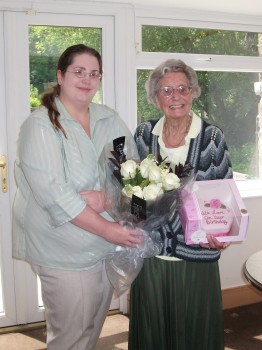Phyllis was one of the loveliest ladies I know, and I will miss her greatly. Words will never do justice to her charm, her sparkling wit, her understated ways, her matter-of-factness, her straightforwardness, and so many other qualities that made her such a wonderful, lovely lady.
She left us yesterday, finally at peace after her struggles.
I don’t know, and will likely never know, what happened – why she’s gone. In the way of grief, part of my mind has become focused on this tidbit, convinced that if I understood why she was gone I’d be more at peace with it. The rest of my mind isn’t so sure, but would like the chance to find out.
I realized last night that for almost none of the deaths that have affected me since moving here have I ever been privy to the causes. The only exception was when my mother told me when “my” cat passed away. PC – Precarious Cat – always liked my mother best, so she stayed living there with her; besides, she was 17 by the time I married and settled here, and very set in her ways, so it felt wrong to contemplate uprooting her. Mom told me about coming home to find PC in a state, rushing her to the vet, what he said, and everything that happened next.
For every death that affected me before I moved here, I was privy to the cause of death. Not generally a blow-by-blow as with PC, but “he had cancer” or “he drowned” or “he was allergic and died of anaphylactic shock.” I suspect the difference is mostly down to the fact that these deaths local to me here have been of my friends and acquaintances, and I’ve not rated as someone worthy to tell what exactly happened; I suspect that the people telling me didn’t rate either. The deaths before were family members and kin (more distant family), so I rated then, and was automatically told.
Phyllis went into the hospital with a chest infection. I visited her a few weeks ago. She was tired, and weak, but she seemed okay. She said she was having trouble catching her breath, so they were trying her on different pills to try to fix this problem. I don’t understand why they didn’t try giving her oxygen. She said she was weak, and couldn’t walk too well; she lived alone, so this needed to be sorted out before she could go home. I knew from a friend who’d visited her before that she was having trouble eating, but there wasn’t a nutrient drip for her, or even a saline drip to make sure she at least stayed hydrated.
I listened to other mutual friends before and after my visit, and I heard, between the lines, them preparing themselves for her death. I didn’t – don’t – get that line of thinking; she was tired, and weak, but she hadn’t seemed anywhere near death’s door to me. I realized, back then, weeks ago, that this is probably a self-preservation measure of theirs, and that I have nothing like it; rather, I always experience any death as a great shock, because my subconcious assumption is that everyone will live forever. This is odd for me, given that I think a lot (relatively) about my own demise; I have a folder of instructions for my own funeral compiled already to save a bit of trouble for my survivors, for example. Yet, it’s true: death is generally a shock to me.
When I got the call, I let my poor friend tasked with telling me keep talking after she’d broken then news, hoping for some explanation. All I heard was the same anger towards the patient that I’d heard in the wake of these other losses (last year there were four in a four-month span): “She hadn’t improved at all.” “She wasn’t eating.” And so on. This victim blaming is undoubtedly done under the just-world fallacy paradigm. They’re blaming the patient for not doing what she was supposed to do, and thus they’re able to comfort themselves that the same won’t happen to them: they’ll do what they’re supposed to do, naturally. It’s the same thing many do with rape victims: they blame the victim for wearing the wrong clothes, etc, comforting themselves that they’ll never be raped because they’ll do what they’re supposed to do.
It occurs to me that it could be a cultural difference, rather than a relationship difference; if it is, then I bet it’d be founded on the biggest underlying difference I’ve noted between these two cultures: Fairness. In the UK, things are supposed to be fair: laws are written to this end, campaigns aimed at making things fairer succeed, and so on. In the US, it’s widely accepted that things are not supposed to be fair, that fairness is a myth. Fair and just go hand in hand, so if the victim-blaming is part of the just-world fallacy, then it’d be based on this notion that life and death are fair – when, in fact, the only fair about death is that it eventually comes to us all.
When I’ve asked (not yet in this case, but last year) what happened, why have they left us, I’m met with stock phrases such as “Well, she was old,” or “She’d been ill.” Those gems were regarding an acquaintance who’d fallen a height of some six feet and broken some ribs. She, too, lived alone, so needed to be able to function again before they sent her home (hospitals here are much quicker to admit and much slower to release patients than any hospitals in the US I’ve ever been around, in my limited experience), so she was in the hospital for a couple of months, I think. But before that? She kept up a very busy social life; she went line dancing every week – she was more active than me! Vera wasn’t old. As her son said at the funeral, “We shouldn’t be here.” No, we really shouldn’t have.
This belief that age is some sort of automatic cause of death really grates on my nerves. People don’t actually die of old age; I wish that myth would kick the bucket already. My friends are simply my friends – they never seem old or young to me; they’re people I can count on, people with open hearts and open minds, people interested in what I have to say, with things to say that I’m interested to hear. Phyllis was one of those, and she never seemed old to me.
This mystery of why she’s gone makes me feel as though I’ve stepped back in time, to the 1600s or some such, when we knew little about how our bodies worked, and you just had to cope with the knowledge that they’d died. I don’t get it; when the electricity or water goes out, the first thing other people ask is why, which is such a trivial, unimportant thing for the customers – something’s broken somewhere, and the company’s fixing it, which is the salient point. All these deaths I’ve been around, though, and no one asks or tells why. Coffins are closed, and it’s generally seen to be poor form to actually cry at a funeral (from what I’ve gathered); how are we meant to come to terms with loss?



Sara Jayne, I am so sorry for your loss. It does seem perplexing why society has this age fixation to attribute older peoples death toward. With all the continuing advances in medicine over the last decades so many illnesses are no longer life threatening as we can live much longer active lives.
Also I don’t see why you can’t ask family or close friends awhile after a passing why someone passed away for the actual reasons, surely the doctor told the family.
The victim blaming completely baffles me. Each person choses how to live their lives and do what they want to do. As we get older sometimes we have to adjust because of physical limitations or impairments but you still chose how to live your life. So to say a person didn’t do this or that, that was their choice and if that contributed to their death then the consequence was of their choosing but they chose how they wanted to live their life and shouldn’t, in my opinion, be blamed or judged for that!
Everyone grieves differently SJ and my perception is the British are more reserved than the Americans, but if you are at a funeral and want to cry over the loss of a friend by all means do that and the heck with what they think or say! As you know the grieving process takes time, if you want to talk call me at any time and I’ll be there to listen or help.
Thanks, Dad. Thanks for the sympathy and the reminder to be myself. Last night, I needed some silly movie to watch, and landed on You, Me, and Dupree, which hit the spot. In it, Dupree exhorts his friend Carl to keep his Carlness, the essence of what makes him him. I think I subconsciously try to fit in sometimes to the detriment of my SJness. Thanks for underscoring that message for me.
As for asking for the why afterwards, the problem is that, in the cases where it matters, I don’t know the family: I only knew the deceased, who (in both cases) lived alone, so simply knocking on their door to meet and then ask their survivors won’t even work. I’ll try again asking mutual friends, but the responses I’ve gotten have so far just been this angry blaming of the deceased or fobbing off that I outlined above – none of which actually answers my question. I do hope the doctors did explain it to the family, at least.
Thanks again for your kindness, Dad. *hugs*